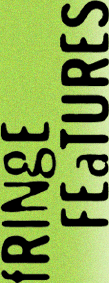The Irreplaceable Peter Jesperson
The fRINGE Interview
By Hollis James
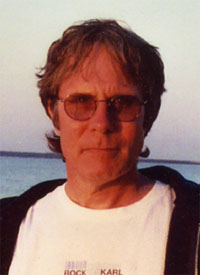 Every once in a while, if you build up enough good editorial karma, you get to interview someone who is as great a person
as he is an interview subject. This was my pleasure in speaking with music-business lifer Peter Jesperson. Within a few minutes it
was obvious that the music-geek in me found a kindred spirit, and—without ever having to say it—I just knew Peter and I shared all
the same problems of the “Where will I fit all my vinyl?” variety. So rare is it, in fact, that I get to share a conversation with
someone who not only gets my obscure references but leaves me in the musical dust that I found it very hard to cease from going off
on various and frequent interview-derailing tangents. Even after the interview, I couldn't exactly figure out an occupational tag to hang on my subject. For the chameleon-like Jesperson, a behind-the-scenes music shaper who has always been undeniably important yet elusively
indefinable, I think it makes perfect sense.
Every once in a while, if you build up enough good editorial karma, you get to interview someone who is as great a person
as he is an interview subject. This was my pleasure in speaking with music-business lifer Peter Jesperson. Within a few minutes it
was obvious that the music-geek in me found a kindred spirit, and—without ever having to say it—I just knew Peter and I shared all
the same problems of the “Where will I fit all my vinyl?” variety. So rare is it, in fact, that I get to share a conversation with
someone who not only gets my obscure references but leaves me in the musical dust that I found it very hard to cease from going off
on various and frequent interview-derailing tangents. Even after the interview, I couldn't exactly figure out an occupational tag to hang on my subject. For the chameleon-like Jesperson, a behind-the-scenes music shaper who has always been undeniably important yet elusively
indefinable, I think it makes perfect sense.
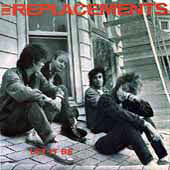 Peter Jesperson’s long journey in music began in 1974, when he became manager of Minnesota record store Oar Folkjokeopus (the
name combines the titles of two great albums, the first by Skip Spence and second by Roy Harper). Peter would hold the position
for nine years, and in that time—as is the way with all great record stores in the middle of nowhere—anyone who’d end up in a
band that mattered eventually turned up, such as Soul Asylum’s Dave Pirner and the Replacements’ Bob Stinson. Peter made his
real mark, however, when he began DJ’ing on local radio and helping talent scout for rock club The Longhorn. In 1977 he co-founded
Twin/Tone Records with friends Paul Stark and Charley Hallman. While Peter has made many contributions to various bands
(at Twin/Tone and elsewhere) over the years, he will perhaps be best known as the man who “discovered” (and recorded and
managed) the Replacements from their shaky-riffed, quaver-voiced inception through their first four brilliant albums until
they defected to a major label. I should make clear—as Peter himself would be quick to agree—that the Replacements were a
great band all by themselves, and if Peter hadn’t been lucky enough to be the first guy to see it, no doubt someone else would
have. Perhaps. But every artist, whether they work in paint, clay or chords, needs that first person to say yes—that first fan.
Peter was their greatest fan.
Peter Jesperson’s long journey in music began in 1974, when he became manager of Minnesota record store Oar Folkjokeopus (the
name combines the titles of two great albums, the first by Skip Spence and second by Roy Harper). Peter would hold the position
for nine years, and in that time—as is the way with all great record stores in the middle of nowhere—anyone who’d end up in a
band that mattered eventually turned up, such as Soul Asylum’s Dave Pirner and the Replacements’ Bob Stinson. Peter made his
real mark, however, when he began DJ’ing on local radio and helping talent scout for rock club The Longhorn. In 1977 he co-founded
Twin/Tone Records with friends Paul Stark and Charley Hallman. While Peter has made many contributions to various bands
(at Twin/Tone and elsewhere) over the years, he will perhaps be best known as the man who “discovered” (and recorded and
managed) the Replacements from their shaky-riffed, quaver-voiced inception through their first four brilliant albums until
they defected to a major label. I should make clear—as Peter himself would be quick to agree—that the Replacements were a
great band all by themselves, and if Peter hadn’t been lucky enough to be the first guy to see it, no doubt someone else would
have. Perhaps. But every artist, whether they work in paint, clay or chords, needs that first person to say yes—that first fan.
Peter was their greatest fan.
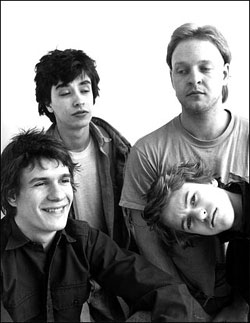 HJ: Will Twin/Tone ever get going again? Or in the indie-label world, when you die do you stay dead?
HJ: Will Twin/Tone ever get going again? Or in the indie-label world, when you die do you stay dead?
PJ: I don’t think it’ll get going again. My two partners and I are still owners of the label, and some of the titles
were licensed and will probably stay licensed, but we’ve started doing some things online—like digital downloads of those
titles currently not available on CD.
HJ: And some of the videos you have on the site are amazing. The Replacements live performances alone are gold.
PJ: (Laughs) Yeah, they are, except for the fact that they’re out of tune on so much of it, which is too bad.
HJ: But that’s the point of that band!
PJ: Yeah, but they weren’t out of tune all the time.
HJ: That’s so like them, though, to be out of tune on the one night you taped.
PJ: Exactly.
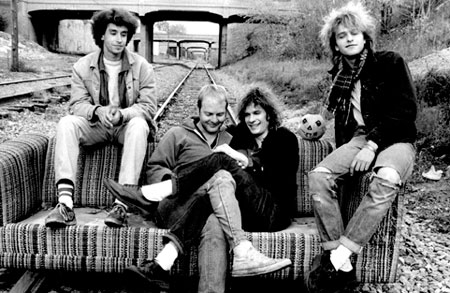
HJ: You had said that the initial reason you (and Paul Stark and Charlie Hallman) started the Twin/Tone label was to record
the best bands in town, and the label seems to have done that rather successfully, but are you happy with the Twin/Tone legacy?
PJ: Very much so. I think there’s only one band that we didn’t get on the label, they were a band called Flamingo—later
The Flaming O’s, then just the O’s. At one time, when the scene really exploded, it was mainly the Suicide Commandos and
Flamingo who were the two bands who were the top of the heap. Flamingo were Stones-ish rock and roll but Suicide Commandos were
more comic-book punk.
HJ: Yeah, I had always heard the Suicide Commandos described as being Ramones-like, but after hearing them, they’re more
like the Dictators, aren’t they? Their album of covers is hysterical, and it’s so much fun.
PJ: It is, and they actually pre-date the Ramones. We were all surprised when the Ramones came out, because we said,
“Oh, they’re doing what the Commandos do.” But you’re right, there were elements of the Dictators in what the Commandos did.
They were also big fans of The Sensational Alex Harvey Band and Roxy Music and Eno’s records. So they liked a lot of different
kinds of things.
HJ: The saddest thing to me about local scenes are all those great forgotten bands—or ones that go unrecorded—like the
Dils and Screamers in L.A. or the Fast in New York. What was the Suicide Commandos’ problem?
PJ: God, I don’t know. I think like a lot of bands I’ve loved over the years, they were a little too sophisticated for
the masses, in a way. They had a great sense of humor and were really intelligent guys. But maybe the stars just didn’t line up
for them. This business is a lot of hard work and a lot of luck.
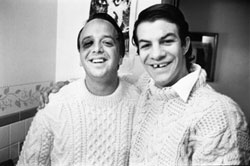 HJ: You mentioned how funny the Commandos were, and the first Ween album was on Twin/Tone. I’ve always felt that Ween
always gets a raw deal from critics because they commit the sin of having a sense of humor. People don’t realize what great
songwriters and musicians they are. And that shortsightedness even hurt people like Frank Zappa in his day. Peter, what’s wrong
with having a sense of humor?
HJ: You mentioned how funny the Commandos were, and the first Ween album was on Twin/Tone. I’ve always felt that Ween
always gets a raw deal from critics because they commit the sin of having a sense of humor. People don’t realize what great
songwriters and musicians they are. And that shortsightedness even hurt people like Frank Zappa in his day. Peter, what’s wrong
with having a sense of humor?
PJ: Exactly. I think that what’s wrong with a lot of modern bands is that they don’t have a sense of humor. I
feel like U2 is a fairly humorless group. And Bruce Springsteen? I mean, my god, I can only take “earnest” so often.
[We continue on a tangent of bashing the earnest and fawning on the humorous before returning to the proper interview.
Besides, we already know my take on those Celtic comic lads known as… U2 —HJ]
HJ: Did Twin/Tone have any competition documenting the Minneapolis scene?
PJ: None. Zero. It isn’t like it is now, where there’s a new label every time you sneeze. The indie label scene was just
beginning. We were excited by what they were doing at Stiff—and one of the main inspirations in my mind was the Beserkley label.
But there were great indie labels around for a long time. Atlantic even started as an independent, and Island too.
HJ: The Suburbs were Twin/Tone’s first release. I hadn’t heard of them until 1983, when “Love Is The Law” was in heavy
rotation on WLIR here in New York. When you signed them, were they the best band around, or did you just feel they’d be the
most easily recordable once you got them in the studio?
PJ: Well, they got great really quickly. I remember they weren’t playing together that long, so when we selected them
from an audition to put out their record a lot of other bands were pissed. They thought they were too green.
HJ: Everybody hates a band who never paid their dues, like the Strokes.
PJ: Sort of, yeah. And I was spinning at the Longhorn then, and the owner was pissed too. He said, “Peter, it sounds to
me like the Suburbs have stepped right off the playground and onto the stage.” And I said, “Wow, that’s a great quote! Can I
use that in the Album jacket copy?”
HJ: People hung the tag “best unknown band” on Soul Asylum for years. I guess they were pretty good, even though the only song
I ever remember liking by them was an early (cassette-only) cover of Johnny Cash’s “Cocaine Blues.” But then, right when they
were on the verge of breaking up, they became huge. Did it surprise you how long it took for them to break through?
PJ: Well…honestly…no. I mean, I loved the band, especially live, and thought they had great potential in an underground sort of way, but I never dreamed they'd have Top 40 hits. No offense to Soul Asylum, but I always felt that the Replacements
were the ones who were really gonna go places.
HJ: Speaking of the Replacements, as you continue to devote so much of your life to music and different bands, does your
discovery of the Replacements become more meaningful to you over time? Does every day in the music biz remind you of just how
rare moments like that are?
PJ: …Yeah! To be honest, yes. If ever a magic moment occurred to me in my life of doing A & R, it was that moment of
listening to the Replacements’ demo for the first time. I just couldn’t believe how good it was. I couldn’t believe I had the
opportunity to make records with them. It was shocking to me.
HJ: You got to play Brian Epstein!
PJ: It was a funny situation, because I was getting a lot of tapes from a lot of bands for different reasons. Some
were Twin/Tone submissions and some were bands auditioning to play the Longhorn, a club that I was helping to coordinate bookings.
When Paul Westerberg brought me that tape that blew me away, it only had four songs on it. So I called him up and asked him,
“Were you thinking of a single or an album?” And he said, quote unquote, if I remember correctly, “You mean you think this shit
is worth recording?” I said, yeah. He said, “I was just trying to get a gig opening for someone at the Longhorn.”
On to page 2 >
|
